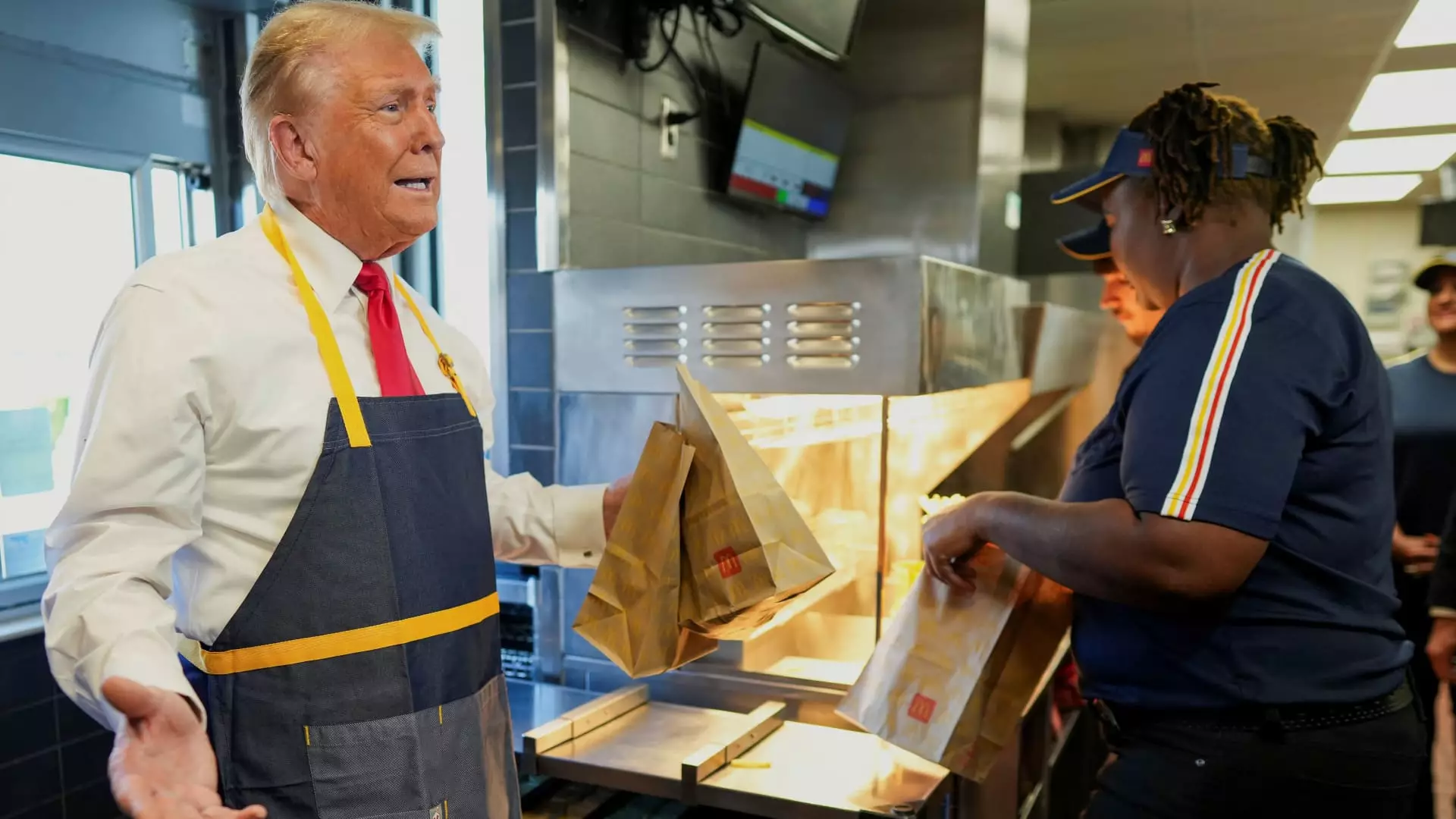As the presidential race intensifies, the intersection of politics and business continues to showcase the complexities that brands face when tangled in the political narrative. A recent visit by former President Donald Trump to a McDonald’s location in Pennsylvania encapsulates this dilemma, prompting the fast-food chain to reiterate its stance of neutrality in the electoral landscape.
Donald Trump’s visit to a McDonald’s in Feasterville, Pennsylvania, ostensibly served as a public relations initiative to associate himself with everyday American experiences. During his brief stint at the restaurant, wherein he learned to operate kitchen equipment and assist customers at the drive-thru, there was a clear attempt to humanize his image while simultaneously launching verbal barbs at his election opponent, Vice President Kamala Harris. Trump’s accusations against Harris center around her claims of working at McDonald’s in her youth, a statement he questions despite lacking substantial evidence.
This incident opens a larger dialogue about the relationship between entertainment, politics, and consumer branding. By stepping into a McDonald’s, Trump connected himself with a beloved American institution, aiming to appeal to the everyday voter. Yet, such moves can often create backlash or unintended consequences, particularly in a politically charged atmosphere.
In light of the heightened scrutiny, McDonald’s has been diligent in maintaining its image as a non-political entity. An internal memo circulated among its staff and viewed by CNBC emphasized the company’s longtime position of not endorsing any candidates or political movements. “McDonald’s does not endorse candidates for elected office and that remains true in this race for the next President,” the memo asserted, reinforcing its commitment to remaining inclusive amid polarized sentiments.
This strategic communication reveals a broader trend in corporate America where businesses strive to balance brand identity with customer sentiment. Over the years, public expectations have shaped how brands engage with social issues, pushing some companies like McDonald’s to adopt a more neutral stance. Interestingly, despite previous support of social movements like Black Lives Matter, McDonald’s is currently trying to sidestep any overt political association.
Recent studies indicate a significant shift in public opinion regarding corporate involvement in politics. A Gallup-University of Bentley poll conducted in spring 2023 showed that only 38% of U.S. adults believed businesses should make public stances on political issues, a notable decline from 48% in just one year. This suggests a growing concern among consumers about the potential alienation that could arise from a company’s political affiliations.
As the political landscape continues to evolve, brands like McDonald’s must carefully navigate their relationship with both customers and politicians. The brand’s mantra of welcoming everyone can easily be compromised if they are perceived to be aligning with a specific political agenda, leading to a potential loss of patronage from a segment of their customer base.
Beyond the political implications, McDonald’s faces economic scrutiny as well. In light of rising prices, the company found itself at the center of a controversy that painted it as unaffordable among some consumers. Memes and social media posts highlighting high prices for menu items have sparked a wave of criticism, especially from those who link these increases to broader economic policies attributed to the Biden administration.
This situation demonstrates how economic factors intersect with the political sphere, and businesses often find themselves as targets of criticism. Observing its pricing models and consumer feedback, McDonald’s President Joe Erlinger had to address the uproar through open letters and fact sheets, underscoring the importance of transparency in pricing amidst inflation concerns.
As we navigate a more contentious political era, the challenges businesses like McDonald’s face are indicative of a broader trend in corporate marketing and public relations. Balancing brand integrity and political neutrality while addressing consumer concerns about affordability requires strategic finesse. The juxtaposition of political events and public sentiment highlights the importance of corporate identity in shaping consumer perceptions. The question remains: can the fast-food titan continue to thrive amid the complexities of the current political climate, or will the pressures of taking a stand ultimately reshape its future?

Leave a Reply